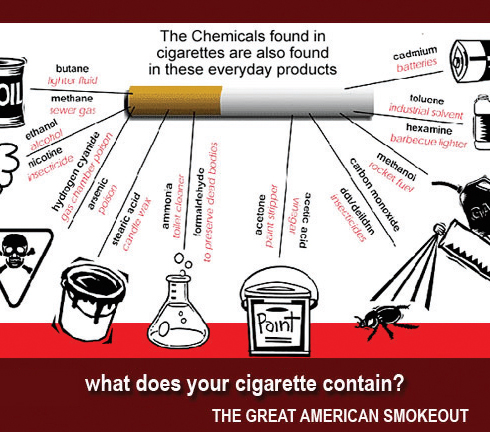Smokers encouraged to quit for one day


For student Elizabeth White, Nov. 18 could be a life-changing day. That’s the day she plans to stop smoking.
White, 19, is among many on campus and thousands nationwide who will participate in the American Cancer Society’s 35th Great American Smokeout.
That day, smokers are encouraged to put down their cigarettes for 24 hours and make a plan to quit smoking altogether, according to the ACS website.
When smokers quit — What are the benefits over time?
20 minutes after quitting: Your heart rate and blood pressure drop.
12 hours after quitting: The carbon monoxide level in your blood drops to normal.
2 weeks to 3 months after quitting: Your circulation improves and your lung function increases.
1 to 9 months after quitting: Coughing and shortness of breath decrease; cilia (tiny hair-like structures that move mucus out of the lungs) regain normal function in the lungs, increasing the ability to handle mucus, clean the lungs, and reduce the risk of infection.
1 year after quitting: The excess risk of coronary heart disease is half that of a smoker’s.
5 years after quitting: Your stroke risk is reduced to that of a non-smoker 5 to 15 years after quitting.
10 years after quitting: The lung cancer death rate is about half that of a person who continues smoking. The risk of cancer of the mouth, throat, esophagus, bladder, cervix, and pancreas decreases, too.
15 years after quitting: The risk of coronary heart disease is the same as a non-smoker’s.
—www.cancer.org.com
White said she has stopped in the past for four months, but started again. This time, she said, she is stopping for good — for health reasons.
“My grandpa and aunt died from smoking so I know what it can do to me.”
Michael McMillian, 27, said he also will attempt to stop smoking during the Great American Smokeout.
The photography major said smoking is his glass of wine at the end of the day, but he realizes his health is more important.
Nursing professor Linda Cowan said smoking is one of the most preventable cause of death.
“All the factors that contribute to a person’s health from smoking are negative.”
Cowan said by stopping smoking, a person can expect to live 10 years longer than one who continue to smoke.
Smoking is responsible for nearly one in five deaths in the U.S., causing 30 percent of all cancer deaths and 87 percent of lung cancer deaths, according to the ACS.
Cowan said smoking impairs circulation in the body, makes healing more difficult and skin more fragile in the healing process.
Some of the health problems caused from smoking are hypertension, influenza and lung cancer, she said.
Chewing tobacco, smokeless tobacco or snuff are just as bad as cigarettes, Cowan said, because all forms of tobacco are harmful.
According to the Centers for Disease Control and Prevention, the harmful effects of smoking do not only affect smokers, but secondhand smoke exposure can cause serious disease and death in non smoking adults and children.
Like any other vice such as overeating, smoking has to be overcome by a lifestyle and habit change, Cowan said.
Nursing major Robert Richardson agrees.
He said he stopped smoking because he did not want to pass down the lifestyle of smoking to his kids. His habit, he said, came from his parents.
However, he said, he does not see a need for the nationally-known day.
“If smokers want to stop smoking, they will stop on their own, not just because of a recognized day,” he said.
“I think it’s futile.”
The 35-year-old said he smoked for 10 years and quit 10 years ago.
Richardson said smoking is unhealthy and a dirty habit he wants to spare his children from.
Cowan agrees that there are no positive results from smoking.
“Smoking is like putting trash into your lungs,” she said.
“The benefits of not smoking are positive to one’s health.”
Accounting professor Ron Summers agrees.
He said he plans take advantage of the Great American Smokeout to help him gradually quit smoking before the campus smoking ban goes into effect next fall.
Cowan said smoking is usually related to something a person is doing.
“For example, ‘when I start my car, I have to smoke my cigarette,’” she said.
“The hardest part is breaking the habitual routine,” Cowan said.
She said to try chewing gum or using a stress ball until the immediate craving passes.
According to the CDC, the nicotine is what smokers are addicted to.
It can be just as addictive as heroin or cocaine, which means smokers can become dependent on it and suffer unpleasant symptoms when trying to stop.
One of the primary health care costs of this country is smoking-related problems, Cowan said.
Diseases caused by cigarette smoking result in $96 billion in health care costs, where much is paid by taxpayers through publicly-funded health programs, according to the CDC.
The American Cancer Society reports that more than 440,000 people die in the U.S. each year as a direct result of tobacco usage.
The ACS website, www.cancer.org has helpful links for the Great American Smokeout, helpful ways of overcoming smoking and resources to help you.
There also are stop smoking hotlines available across the country according to the website. Call 1-800-ACS-2345 to find stop smoking resources in your area.